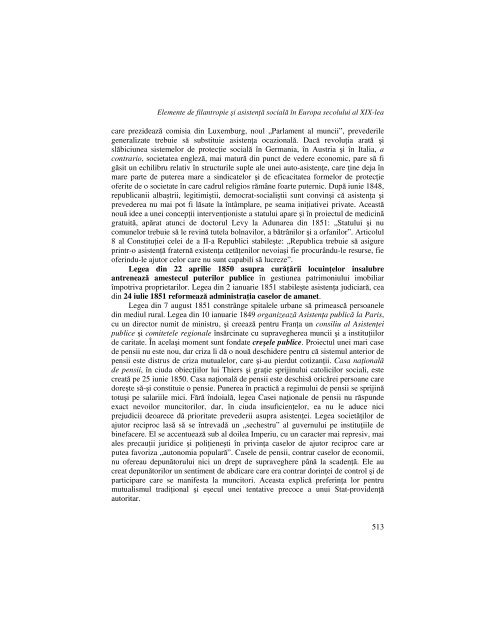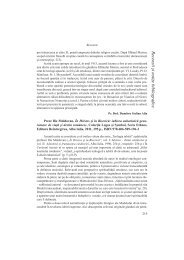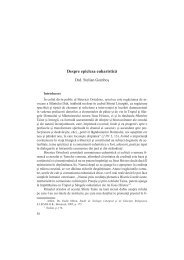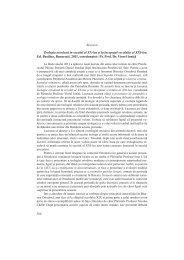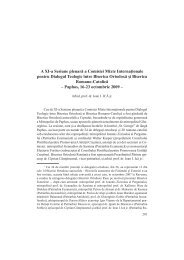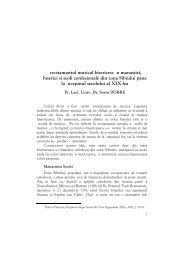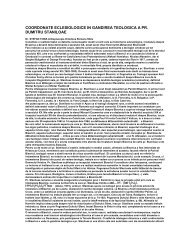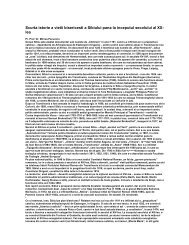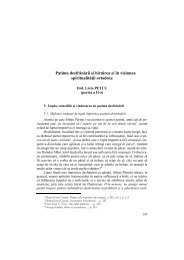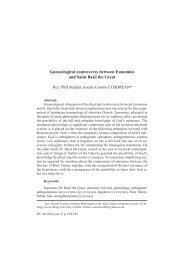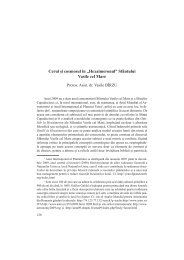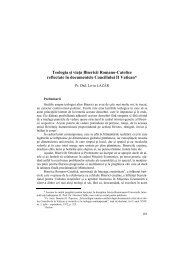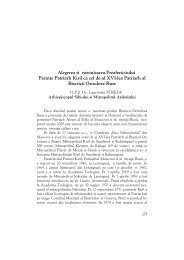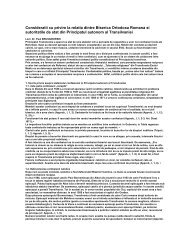Elemente de filantropie şi asisten ă socială în ... - Revista Teologica
Elemente de filantropie şi asisten ă socială în ... - Revista Teologica
Elemente de filantropie şi asisten ă socială în ... - Revista Teologica
Create successful ePaper yourself
Turn your PDF publications into a flip-book with our unique Google optimized e-Paper software.
<strong>Elemente</strong> <strong>de</strong> <strong>filantropie</strong> <strong>şi</strong> <strong>asisten</strong>ţ<strong>ă</strong> social<strong>ă</strong> <strong>în</strong> Europa secolului al XIX-lea<br />
care prezi<strong>de</strong>az<strong>ă</strong> comisia din Luxemburg, noul „Parlament al muncii”, preve<strong>de</strong>rile<br />
generalizate trebuie s<strong>ă</strong> substituie <strong>asisten</strong>ţa ocazional<strong>ă</strong>. Dac<strong>ă</strong> revoluţia arat<strong>ă</strong> <strong>şi</strong><br />
sl<strong>ă</strong>biciunea sistemelor <strong>de</strong> protecţie social<strong>ă</strong> <strong>în</strong> Germania, <strong>în</strong> Austria <strong>şi</strong> <strong>în</strong> Italia, a<br />
contrario, societatea englez<strong>ă</strong>, mai matur<strong>ă</strong> din punct <strong>de</strong> ve<strong>de</strong>re economic, pare s<strong>ă</strong> fi<br />
g<strong>ă</strong>sit un echilibru relativ <strong>în</strong> structurile suple ale unei auto-<strong>asisten</strong>ţe, care ţine <strong>de</strong>ja <strong>în</strong><br />
mare parte <strong>de</strong> puterea mare a sindicatelor <strong>şi</strong> <strong>de</strong> eficacitatea formelor <strong>de</strong> protecţie<br />
oferite <strong>de</strong> o societate <strong>în</strong> care cadrul religios r<strong>ă</strong>mâne foarte puternic. Dup<strong>ă</strong> iunie 1848,<br />
republicanii albaştrii, legitimiştii, <strong>de</strong>mocrat-socialiştii sunt convin<strong>şi</strong> c<strong>ă</strong> <strong>asisten</strong>ţa <strong>şi</strong><br />
preve<strong>de</strong>rea nu mai pot fi l<strong>ă</strong>sate la <strong>în</strong>tâmplare, pe seama iniţiativei private. Aceast<strong>ă</strong><br />
nou<strong>ă</strong> i<strong>de</strong>e a unei concepţii intervenţioniste a statului apare <strong>şi</strong> <strong>în</strong> proiectul <strong>de</strong> medicin<strong>ă</strong><br />
gratuit<strong>ă</strong>, ap<strong>ă</strong>rat atunci <strong>de</strong> doctorul Levy la Adunarea din 1851: „Statului <strong>şi</strong> nu<br />
comunelor trebuie s<strong>ă</strong> le revin<strong>ă</strong> tutela bolnavilor, a b<strong>ă</strong>trânilor <strong>şi</strong> a orfanilor”. Articolul<br />
8 al Constituţiei celei <strong>de</strong> a II-a Republici stabileşte: „Republica trebuie s<strong>ă</strong> asigure<br />
printr-o <strong>asisten</strong>ţ<strong>ă</strong> fratern<strong>ă</strong> existenţa cet<strong>ă</strong>ţenilor nevoia<strong>şi</strong> fie procurându-le resurse, fie<br />
oferindu-le ajutor celor care nu sunt capabili s<strong>ă</strong> lucreze”.<br />
Legea din 22 aprilie 1850 asupra cur<strong>ă</strong>ţ<strong>ă</strong>rii locuinţelor insalubre<br />
antreneaz<strong>ă</strong> amestecul puterilor publice <strong>în</strong> gestiunea patrimoniului imobiliar<br />
împotriva proprietarilor. Legea din 2 ianuarie 1851 stabileşte <strong>asisten</strong>ţa judiciar<strong>ă</strong>, cea<br />
din 24 iulie 1851 reformeaz<strong>ă</strong> administraţia caselor <strong>de</strong> amanet.<br />
Legea din 7 august 1851 constrânge spitalele urbane s<strong>ă</strong> primeasc<strong>ă</strong> persoanele<br />
din mediul rural. Legea din 10 ianuarie 1849 organizeaz<strong>ă</strong> Asistenţa public<strong>ă</strong> la Paris,<br />
cu un director numit <strong>de</strong> ministru, <strong>şi</strong> creeaz<strong>ă</strong> pentru Franţa un consiliu al Asistenţei<br />
publice <strong>şi</strong> comitetele regionale <strong>în</strong>s<strong>ă</strong>rcinate cu supravegherea muncii <strong>şi</strong> a instituţiilor<br />
<strong>de</strong> caritate. În acela<strong>şi</strong> moment sunt fondate creşele publice. Proiectul unei mari case<br />
<strong>de</strong> pensii nu este nou, dar criza îi d<strong>ă</strong> o nou<strong>ă</strong> <strong>de</strong>schi<strong>de</strong>re pentru c<strong>ă</strong> sistemul anterior <strong>de</strong><br />
pensii este distrus <strong>de</strong> criza mutualelor, care <strong>şi</strong>-au pierdut cotizanţii. Casa naţional<strong>ă</strong><br />
<strong>de</strong> pensii, <strong>în</strong> ciuda obiecţiilor lui Thiers <strong>şi</strong> graţie sprijinului catolicilor sociali, este<br />
creat<strong>ă</strong> pe 25 iunie 1850. Casa naţional<strong>ă</strong> <strong>de</strong> pensii este <strong>de</strong>schis<strong>ă</strong> oric<strong>ă</strong>rei persoane care<br />
doreşte s<strong>ă</strong>-<strong>şi</strong> constituie o pensie. Punerea <strong>în</strong> practic<strong>ă</strong> a regimului <strong>de</strong> pensii se sprijin<strong>ă</strong><br />
totu<strong>şi</strong> pe salariile mici. F<strong>ă</strong>r<strong>ă</strong> <strong>în</strong>doial<strong>ă</strong>, legea Casei naţionale <strong>de</strong> pensii nu r<strong>ă</strong>spun<strong>de</strong><br />
exact nevoilor muncitorilor, dar, <strong>în</strong> ciuda insuficienţelor, ea nu le aduce nici<br />
prejudicii <strong>de</strong>oarece d<strong>ă</strong> prioritate preve<strong>de</strong>rii asupra <strong>asisten</strong>ţei. Legea societ<strong>ă</strong>ţilor <strong>de</strong><br />
ajutor reciproc las<strong>ă</strong> s<strong>ă</strong> se <strong>în</strong>trevad<strong>ă</strong> un „sechestru” al guvernului pe instituţiile <strong>de</strong><br />
binefacere. El se accentueaz<strong>ă</strong> sub al doilea Imperiu, cu un caracter mai represiv, mai<br />
ales precauţii juridice <strong>şi</strong> poliţieneşti <strong>în</strong> privinţa caselor <strong>de</strong> ajutor reciproc care ar<br />
putea favoriza „autonomia popular<strong>ă</strong>”. Casele <strong>de</strong> pensii, contrar caselor <strong>de</strong> economii,<br />
nu ofereau <strong>de</strong>pun<strong>ă</strong>torului nici un drept <strong>de</strong> supraveghere pân<strong>ă</strong> la sca<strong>de</strong>nţ<strong>ă</strong>. Ele au<br />
creat <strong>de</strong>pun<strong>ă</strong>torilor un sentiment <strong>de</strong> abdicare care era contrar dorinţei <strong>de</strong> control <strong>şi</strong> <strong>de</strong><br />
participare care se manifesta la muncitori. Aceasta explic<strong>ă</strong> preferinţa lor pentru<br />
mutualismul tradiţional <strong>şi</strong> eşecul unei tentative precoce a unui Stat-provi<strong>de</strong>nţ<strong>ă</strong><br />
autoritar.<br />
513


